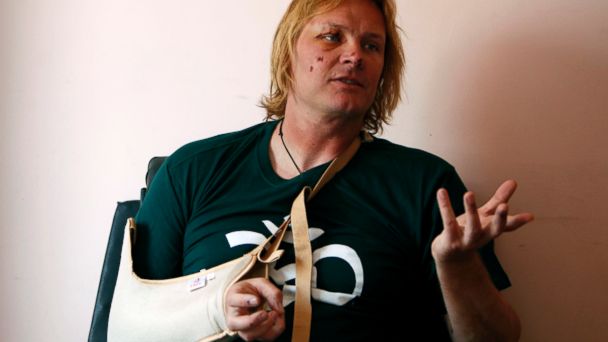Climber Survives 70-Foot Drop Into a Crevasse in Nepal
ABC News' Hamish Macdonald reports:
Once upon a time, people survived to tell the story. In avid climber John All's case, he told the story and then survived.
All, an associate professor of geography at Western Kentucky University, was scouting a route alone on Monday along Mount Himlung in Nepal and collecting snow samples to study climate change and pollution on glaciers. His team remained at camp to rest.
Related: Mt. Everest climbs called off after sherpas' deaths.
"I went out to collect that data and scout that stuff, sort of not expecting anything at all," he told ABC News from Katmandu today. Then he fell 70 feet into a crevasse.
"[It was a] creepily flat glacier," he said. "So [I] went from walking along in a brilliant white snow field to suddenly plunging through a mine shaft and bouncing off the walls, starting with my face."
An icy ledge ended his fall, stopping him from going deeper into the hole. He suffered a broken arm and ribs as well as other injuries.
He managed to record the decisions he'd have to make. He then posted it to Facebook, even before he was rescued.
"I took the video as sort of an affirmation. … I thought to myself that I'm going to get out of here and I want my family to be able to see what's happening and understand what my life and how I have to fight through some things is like," All said.

Western Kentucky University professor John All speaks during an interview with The Associated Press in Katmandu, Nepal, May 22, 2014. (Niranjan Shrestha/AP Photo)
All said he was wearing just a light jacket and pants.
"I was getting hypothermic within five minutes of being there," he said. "The only thing that was going to keep me alive was constantly moving and fighting my way up before it got dark."
It took six hours for All to climb out of the hole using his ice ax and another day for help to arrive.
"When you know you were in a position to die - and you should have died and somehow you didn't - yeah, that kind of bothers you," he said. "That's something that I'm going to have to live with for quite a while. … It doesn't go away."
The Associated Press contributed to this report.